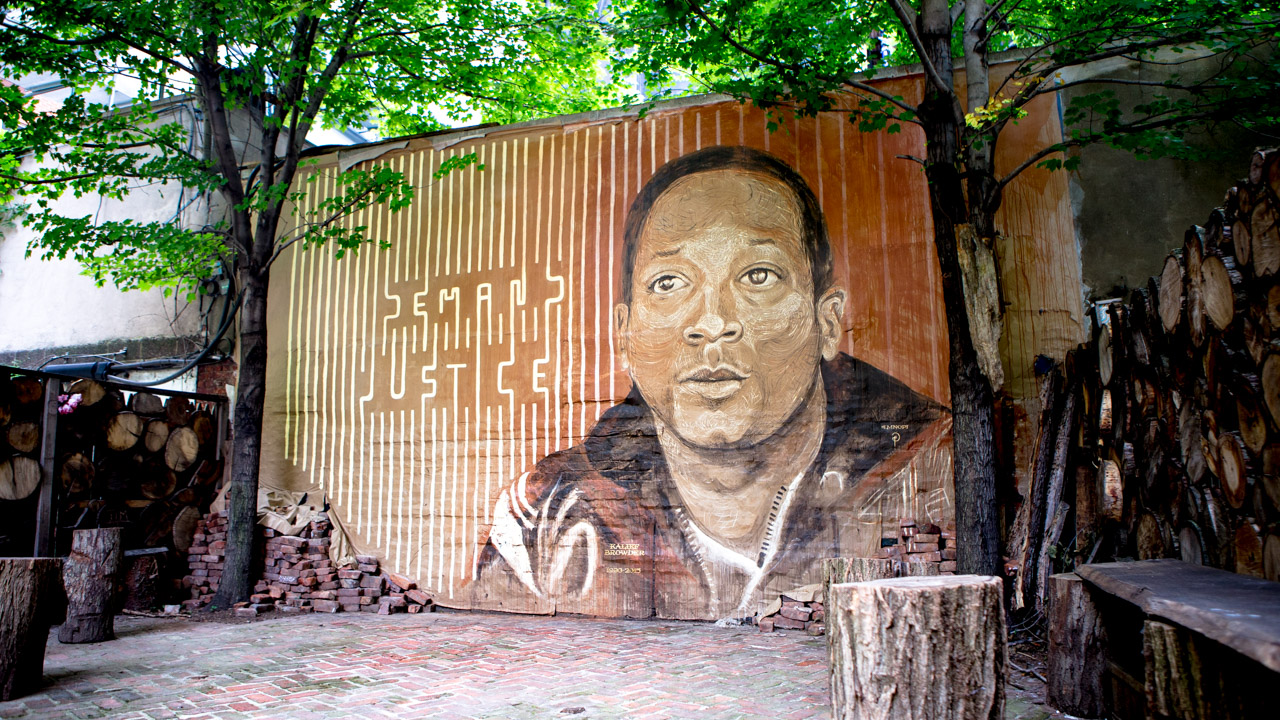Street artistsGilf! and Lmnopi collaborated on a new mural dedicated to Kalief Browder, the young Bronx man who was held for more than three years at Rikers Island without a trial and later committed suicide. The art was unveiled to the public in Soho on Saturday and included a Q&A with the curator, artists, Kalief’s family, and their lawyer.
Kalief’s portrait is painted with the delicate brush strokes that Lmnopi has used to depict victims of state violence and social justice champions. The background is constructed with Gilf’s rigid, geometric lines, which she has used to create abstract maze-like patterns in many of her recent works, only here they are used to depict the image of prison bars. The words “Demand Justice” – the title of the piece – are bent into the bars next to Kalief’s gaze.
“This is far more legible than my work often is,” Gilf told ANIMAL in a phone interview, “because I thought it was more important for the point to come through, to not be passive, to make a direct statement.”
She said it was extremely powerful working with family, who told her that passing legislation was one thing, but having a piece like this to gather around touched them in a way that the legal process couldn’t
“Art has the power to do that – to bring a community together around a subject like this – especially street art,” explained Gilf. “Since it is so hip right now, street art can engage people beyond the activist community, particularly when that is magnified through social media.”
For her part, Gilf thinks the critical step in reforming Rikers and the prison system as a whole is accountability. “Some laws have been passed, but now we need to focus on enforcement. There needs to be a non-partial, third party on Rikers enforcing the laws for the guards.”
Kalief’s brother, Akeem Browder, largely agrees. “All of the things that happened to Kalief were already illegal,” he said, “so why are we advocating to make them extra illegal? What we need to do is convict and reprimand those who have already broken the law.”
Akeem spoke about the guard who is seen assaulting his brother on video. “We saw the paperwork that the officer filled out after that incident. He said Kalief tried to escape, but in the video you see him handcuffed, with mittens on, and the guard beating him for no reason. The officer should be fired for lying, if nothing else. They say they are doing an investigation, but how long should the investigation take? The video is right there. He should be fired. But he is not, and in the meantime, he is working as a corrections officer, taking care of other people’s fathers, brothers, and sons.”
Akeem says the person who leaked the video to his family is the only person who has been fired over the incident, a response typical of many whistleblower incidents. Akeem himself worked at Rikers as an engineer for one-and-a-half years while Kalief was imprisoned there. “I couldn’t even say hi to my brother, otherwise I would be investigated. That’s the problem. Anyone who cares about the inmates is seen as suspect, but the people who are brutal and vicious are never reprimanded.”
Advocates close to Rikers think that the prison needs to be shut down completely for any reform to be successful. Five Mualimm-ak, CEO and Executive Director of the Incarcerated Nation Corporation, said that many of the successes celebrated in the current push for Rikers Reform are simply untrue. “We are told that everyone gets one hour of yard time per day, but we know how many people are in Rikers and how many people fit in the yard, and this promise is simply a mathematical impossibility. Even less possible is the promise that each inmate can have a visitor each day, and with visitation limited to an hour, most of that time is wasted transporting the inmate to the visitation, meaning people are denied access to their family, which is crucial for any type of meaningful rehabilitation.”
Dakem Roberts, an organizer with Reform Rikers and the Jails Action Coalition, believes that internships and apprenticeships are critical for prison reform. Dakem says he’s a prison abolitionist, because prisons function as encampments of slave labor. By returning the value of people’s labor to themselves, he argues, you can begin to dismantle the prison industrial complex.
For his part, Kalief’s brother wants everyone to stay engaged. “People have a tendency to move on from one story to the next in our culture, and each story becomes just a story, like a book or a movie. I’m asking people not to move on to the next story, but to move on to the next step. Join your community council, demand reform. From my family to everyone else’s: we appreciate this artwork and everyone’s thoughts, but what matters more is: let’s not let any other family go through this.”
“Demand Justice” is on display in the garden of the Henley Vaporium in Soho through July.
(Photo: Aymann Ismail/ANIMALNewYork)


